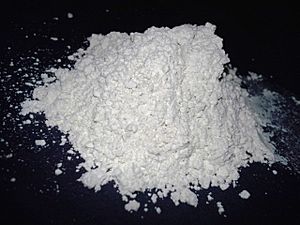Diatomaceous earth facts for kids
Diatomaceous earth, also called diatomite, is a soft, chalk-like rock found in nature. It can be easily crushed into a fine, light-colored powder. This powder feels a bit rough, like pumice, and is very light because it has many tiny holes. It's mostly made of silica and comes from the fossilized remains of tiny, hard-shelled algae called diatoms. People use diatomaceous earth for many things, like helping to filter liquids, as a gentle abrasive, to control insects, to soak up spills, as cat litter, and even as a part of dynamite. It can also handle heat well, so it's sometimes used as an insulator.
Contents
What is Diatomaceous Earth Used For?
Filtering Liquids
One of the main uses for diatomaceous earth (about 68% of its use!) is as a filter material. It's especially popular for swimming pools. Diatomaceous earth is very porous because it's made of tiny, hollow particles that look a bit like miniature coffins under a microscope. In chemistry, it helps filter out very small particles that might otherwise get through or clog regular filter paper. It's also used to filter water and other liquids like beer, syrups, and sugar. Other industries use it as a filler in things like paper, paints, ceramics, soap, and detergents.
Gentle Cleaning and Polishing
One of the oldest ways people used diatomite was as a very mild abrasive. This means it's gentle enough to be used in toothpaste and to make metal items shiny in polishes.
Natural Pest Control
Diatomaceous earth is also used to control insects. The fine powder makes tiny cuts in the waxy outer layer of insects, which causes them to dry out and die. This method also works against slugs, and gardeners often use it to protect their plants. Some beekeepers are even trying it to stop small hive beetles from breeding. Sometimes, it's mixed with other things to make it work even better. A special type of diatomaceous earth is sometimes used to help de-worm animals and even humans.
Soaking Up Spills
Because it's so good at soaking things up, diatomaceous earth is useful for cleaning up spills. The U.S. Center for Disease Control even suggests using it to clean up toxic liquid spills.
More recently, diatomaceous earth has become a main ingredient in some types of cat litter. The kind of silica used in cat litter usually comes from freshwater sources, which means it's generally safe for pets and people.
In 1867, a famous inventor named Alfred Nobel found that nitroglycerin (a powerful liquid) became much safer and more stable when it was soaked up by diatomaceous earth. He patented this mixture, and it became known as dynamite.
Where Does Diatomaceous Earth Come From?
Diatomaceous earth forms from the remains of diatoms that lived in water. So, you'll find it near places that are or used to be bodies of water. There are generally two types of diatomaceous earth, depending on where they come from: freshwater and saltwater.
- Freshwater diatomaceous earth is dug up from dry lakebeds. It usually has a low amount of a certain type of silica called crystalline silica.
- Saltwater diatomaceous earth has a higher amount of crystalline silica. This type is very useful for filters because its crystals have tiny sieve-like features.
Different Kinds of Diatomaceous Earth
- Tripolite is the name for the type found in Tripoli, Libya.
- Bann clay refers to the type found in the Lower Bann valley in Northern Ireland.
Is Diatomaceous Earth Safe?
If you handle diatomaceous earth without gloves, its absorbent qualities can make your hands feel very dry. The saltwater form of diatomaceous earth contains a type of silica with sharp edges. Because of this, it's important to wear a dust mask when working with it, as breathing in the dust can be harmful.
The danger from breathing in the dust depends on the type of silica. Crystalline silica can be a serious hazard if inhaled often, as it can cause lung problems and may lead to cancer over a long time. Amorphous silica can make your lungs dusty but doesn't carry the same high risk. Food-grade diatomaceous earth usually has very little crystalline silica. However, diatomaceous earth made for pool filters is heated, which changes its silica into the crystalline form. So, if you're going to be around diatomaceous earth, it's important to know how much crystalline silica it contains.
Images for kids
-
A scanning electron micrograph of diatomaceous earth.
See also
 In Spanish: Diatomita para niños
In Spanish: Diatomita para niños
 | Selma Burke |
 | Pauline Powell Burns |
 | Frederick J. Brown |
 | Robert Blackburn |









